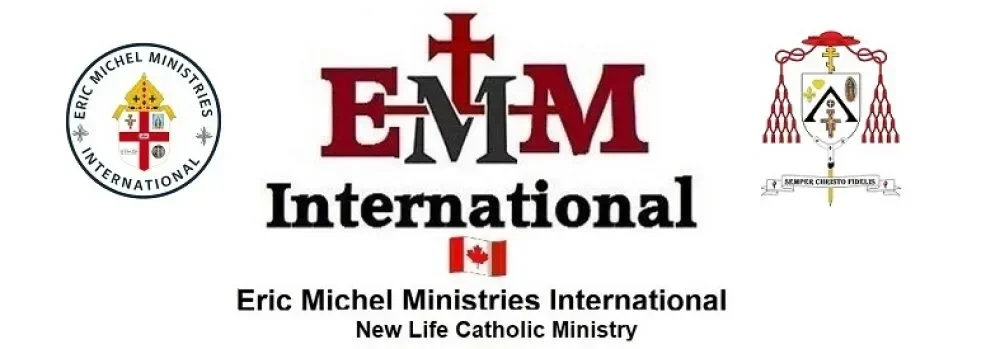
Confraternity of Penitents
1702 Lumbard Street
Fort Wayne IN USA 46803
260-739-6882
copenitents@yahoo.com
May God bless you and give you joy!

Ordo Franciscanus Saecularis (Affiliate CfP Fort Wayme)
Confraternity of Penitents (people who are sorry for their sins and want to make up for them)
The canonical status of the Confraternity of Penitents is a private association of the faithful with commendation.
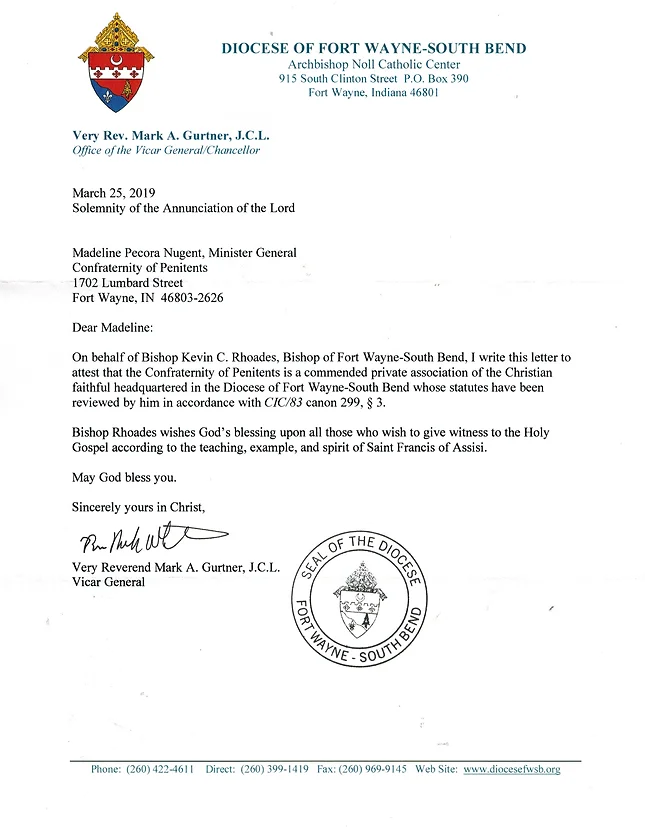
Affiliates of the Confraternity of Penitents
The Confraternity of Penitents is most grateful to God for its Affiliates. Affiliates are those who support and pray for the Confraternity but who do not participate in formation.
The following obligations must be fulfilled for Affiliate status:
- Promotion of penance (conversion) in ways suitable to the Affiliate’s vocation.
- Offering attendance at one Mass per year for deceased penitents.
- Fully living Article and Statutes 26 of the CFP Rule enjoins peace with all.
- Being consecrated to Our Lady and praying a daily Marian Consecration prayer of their choice.
- Praying daily a brief Affiliates’ Prayer for the Confraternity of Penitents
Priests, Deacons, and Religious Affiliates are also asked to consider becoming Spiritual Assistants for CFP Chapters or Circles and/or Spiritual Directors for CFP Members and Associates as their time, wishes, and obligations permit. Priest Affiliates are asked to celebrate one Mass yearly for all deceased penitents.
Affiliates will receive the Affiliates’ Prayer and Certificate of their Affiliation. With the permission of the Confraternity leadership sponsoring the event, Affiliates may attend CFP functions and meetings. The Confraternity of Penitents prays daily for all its Affiliates.
The following Affiliate Application may be copied and pasted into a Microsoft Word document and postally mailed to the Confraternity of Penitents. It can also be copied and pasted into an email and emailed to the CFP. If you have difficulty with either of these, please contact us, and we will ensure you receive an application.
Affiliates’ Prayer for the Confraternity of Penitents
Blessed Lord, as You made Saint Francis reflective of the image of Christ through a life of humility and penance, so, too, please help us and all of our brothers and sisters to die in the world with You so that our hearts may be inflamed with the fire of Your Love. Finally, we may be brought to new life. Please have mercy on all those burdened with leadership in the Confraternity, especially the Bishop, Visitor, Minister General, Regional Ministers, Ministers, Officers, and Formators. Father, please renew the marks of Jesus’ Passion on our souls and bring us to perfection for the sake of Your glory. We ask this through Christ our Lord, Who lives and reigns with You and the Holy Spirit, God, world without end. Amen.
Our Lady of the Angels, pray for us.
Saint Francis, pray for us.
Saint Clare, pray for us.
Saint Anthony, pray for us.
All you saints of God, pray for us. Amen.
Affiliés de la Confraternité des Pénitents
La Confraternité des Pénitents est très reconnaissante envers Dieu pour ses Affiliés. Les Affiliés sont ceux qui soutiennent et prient pour la Confraternité mais qui ne participent pas à la formation.
Les obligations suivantes doivent être remplies pour obtenir le statut d’Affilié :
- Promotion de la pénitence (conversion) de manière adaptée à la vocation de l’Affilié.
- Offrir la participation à une messe par an pour les pénitents décédés.
- Vivre pleinement l’article et les statuts 26 de la Règle de la CFP qui ordonne la paix avec tous.
- Être consacré à Notre-Dame et prier une prière de consécration mariale quotidienne de son choix.
- Prier quotidiennement une brève prière des affiliés pour la Confrérie des Pénitents
Les prêtres, diacres et religieux affiliés sont également invités à envisager de devenir assistants spirituels pour les chapitres ou cercles de la CFP et/ou directeurs spirituels pour les membres et associés de la CFP, selon leur temps, leurs souhaits et leurs obligations. Les prêtres affiliés sont invités à célébrer une messe par an pour tous les pénitents décédés.
Les affiliés recevront la prière des affiliés et le certificat de leur affiliation. Avec la permission des dirigeants de la Confrérie qui parrainent l’événement, les affiliés peuvent assister aux fonctions et réunions de la CFP. La Confrérie des Pénitents prie quotidiennement pour tous ses affiliés.
La demande d’affiliation suivante peut être copiée et collée dans un document Microsoft Word et envoyée par courrier postal à la Confrérie des Pénitents. Ou elle peut être copiée et collée dans un e-mail et envoyée par courrier électronique à la CFP. Si vous rencontrez des difficultés avec l’une ou l’autre de ces questions, veuillez nous contacter et nous veillerons à ce que vous receviez une demande.
Prière des affiliés pour la Confraternité des Pénitents
Seigneur béni, comme tu as fait de saint François un reflet de l’image du Christ par une vie d’humilité et de pénitence, aide-nous aussi, ainsi que tous nos frères et sœurs, à mourir au monde avec toi, afin que nos cœurs soient enflammés par le feu de ton amour et que nous puissions enfin être amenés à une vie nouvelle. Aie pitié de tous ceux qui sont chargés de diriger la Confraternité, en particulier l’évêque, le visiteur, le ministre général, les ministres régionaux, les ministres, les officiers et les formateurs. Père de tous, renouvelle les marques de la Passion de Jésus sur nos âmes et amène-nous à la perfection pour l’amour de ta gloire. Nous te le demandons par le Christ notre Seigneur, qui vit et règne avec toi et le Saint-Esprit, Dieu, pour les siècles des siècles. Amen
Notre-Dame des Anges, prie pour nous.
Saint François, prie pour nous.
Sainte Claire, priez pour nous.
Saint Antoine, priez pour nous.
Vous tous, saints de Dieu, priez pour nous. Amen.
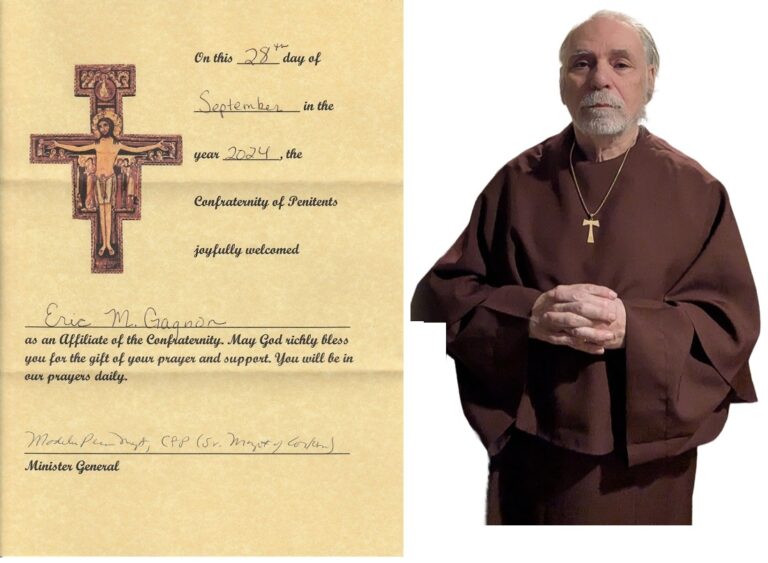
Eric Michel is an affiliate of the Confraternity of Penitents Fort Wayne
The Secular Franciscan Order (SFO)
Tiers ordre franciscain (TOF)
♰ Pax et Bonum ♰
Please note: Eric Michel is a member of CFP Affiliate Not the Eric Michel Ministries International as a charter from the Order of Franciscans of the Eucharist (OFE) (Resigned from the Chart)
This website shares some information about Franciscans from their foundation. We at EMMI do not represent the OFS. This website is not affiliated with, nor endorsed by, the Secular Franciscan Order or any fraternity .

It was founded in 1209 by St Francis of Assisi as a third-order secular, a Catholic lay order of men and women associated with the Franciscans. Approved 18 Aug 1289, at which time the SFO was an order of penitents who lived in their own homes, while the related R-XR0400 – Tertius Ordo Regularis Sancti Francisci (TOR) already lived in small communities. Renewed Rule approved, 24 Jun 1978, by Paul VI. Also known as Third Order Secular of St Francis and Terz’Ordine Francescano
The Secular Franciscan Order (formerly known as the Third Order of St. Francis) was founded by St. Francis of Assisi in the thirteenth century. Originally, we were known as the Brothers and Sisters of Penance. The Secular Franciscan Order in the Catholic Church belongs to a global Franciscan Family that often works for justice, peace, and the care of creation throughout the world.
“The Rule of the Secular Franciscan Order, “The Franciscan family, as one among many spiritual families raised by the Holy Spirit in the Church, unites all members of the people of God – laity, religious, and priests – who recognize that they are called to follow Christ in the footsteps of St. Francis of Assisi. In various ways and forms but in life-giving union with each other, they intend to present the charism of their typical Seraphic Father in the life and mission of the Church.

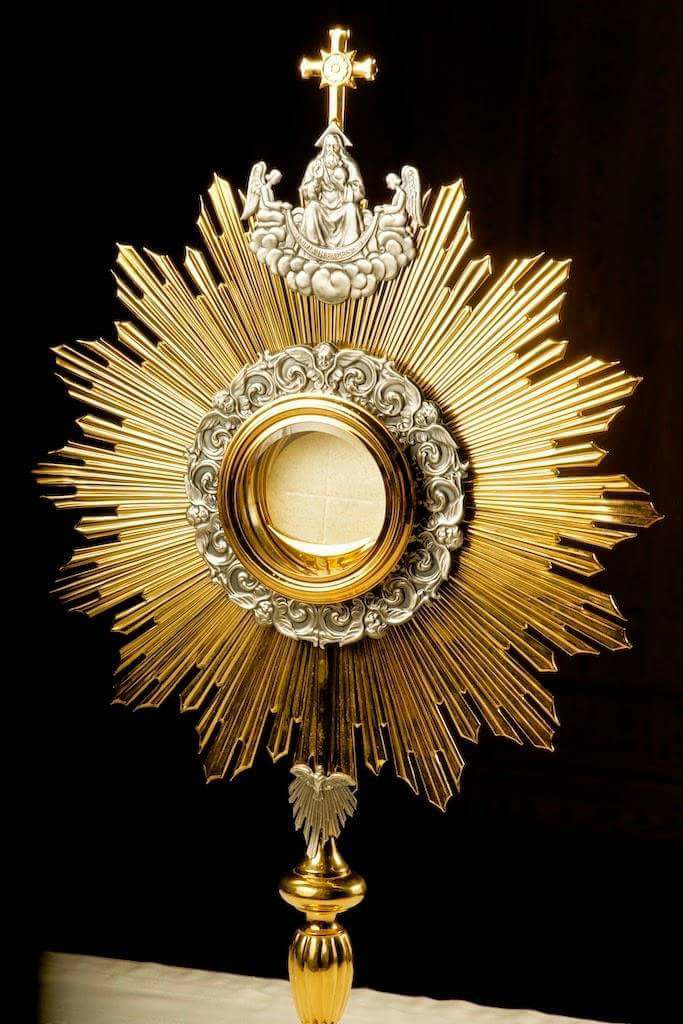
he EMMI Secular Franciscan Order is a community of Catholic men and women of any of the Rites in communion with Rome.
Our Mission Statement – “Our mission is to observe the gospel of our Lord Jesus Christ by following the example of our holy father, Saint Francis of Assisi and the beautiful example of our beloved Saint Clare of Assisi, who made Christ the inspiration of their lives, in a spirit of community, humility, adoration and compassion, mirroring Christ in our lives.”
To become a Secular Franciscan, one must:
- profess the Catholic faith
- live in communion with the Church
- be of good moral standing
- have a discerned vocation to the Order
Catholic Link
https://www.vatican.va/content/vatican/en.html
https://www.cccb.ca/
https://www.usccb.org/sites/default/files/flipbooks/catechism/
https://www.wordonfire.org/

- In the Name of the Lord begins the life of the Minor Brothers The Rule and life of the Minor Brothers is this, namely, to observe the holy Gospel of our Lord Jesus Christ by living in obedience, without property and in chastity. Brother Francis promises obedience and reverence to the Lord Pope Honorius and to his successors canonically elected and to the Roman Church. And let the other brothers be bound to obey Brother Francis and his successors.
- Of those who wish to embrace this Life and how they ought to be received If any wish to embrace this life and come to our brothers, let them send them to their provincial ministers, to whom alone and not to others is accorded the power of receiving brothers. But let the ministers diligently examine them regarding the Catholic faith and the Sacraments of the Church. And if they believe all these things, and if they will confess them faithfully and observe them firmly to the end, and if they have no wives, or, if they have and their wives have already entered a monastery, or have, with the authority of the diocesan bishop, given them permission after having made a vow of continence, and if the wives be of such an age that no suspicion may arise concerning them, let them [the ministers] say to them the word of the holy Gospel, that they go and sell all their goods and strive to distribute them to the poor. If they should not be able to do this, their goodwill suffices. And the brothers and their ministers must not be solicitous about their temporal affairs, which they may freely do with their affairs, whatever the Lord may inspire them. If counsel should be required, the ministers shall have the power to send them to some God-fearing men whose advice their goods may be distributed to the poor. Afterwards, let them give them clothes of probation, two tunics without a hood and a cord and breeches and a chaperon reaching to the cord, unless at some point the same ministers may decide otherwise according to God. The year of probation being finished, they shall be received to obedience, promising to observe always this life and rule. And according to the command of the Lord Pope, in no wise shall it be allowed them to go out of this religion because according to the holy Gospel: “No man putting his hand to the plough and looking back is fit for the kingdom of God.” And let those who have already promised obedience have one tunic with a hood and, if they wish, another without a hood. And those who are obliged by necessity may wear shoes. Let all the brothers be clothed in poor garments, and they may patch them with pieces of sackcloth and other things, with the blessing of God. I admonish and exhort them not to despise or judge men they see clothed in delicate and showy garments using dainty meats and drinks but rather let each judge and despise himself.
- Of the Divine Office, and Fasting; and how the Brothers must go through the world Let the clerics perform the Divine Office according to the order of the holy Roman Church, except the Psalter, wherefore they may have breviaries. But let the laics say twenty-four Paternosters for Matins; five for Lauds; for Prime, Tierce, Sext and Nones, for each of these, seven; for Vespers, however, twelve, for Compline seven; and let them pray for the dead. And let them fast from the feast of All Saints until the Nativity of the Lord. But the holy Lent begins from Epiphany and continues for forty days, which the Lord has consecrated by His holy fast. May those who keep it voluntarily be blessed by the Lord, and those who do not wish may not be constrained. But they must fast during the other one until the Resurrection of the Lord. However, they shall not be obliged to fast at any time except Fridays. But the brothers shall not be bound to corporal fasting in time of manifest necessity. I indeed counsel, warn, and exhort my brothers in the Lord Jesus Christ that when they go through the world, they are not litigious nor contend in words, nor judge others; but that they are gentle, peaceful, and modest, meek and humble, speaking honestly to all as is fitting. And they must not ride on horseback unless compelled by manifest necessity or infirmity. Let them first say, Into any house they may enter: Peace be to this house! And, according to the holy Gospel, it is lawful to eat all foods set before them.
- That the Brothers must not receive money
- I strictly enjoin all the brothers that they do not receive coins or money, either themselves or through an interposed person. Nevertheless, for the necessities of the sick and for clothing the other brothers, let the ministers and custodes alone take watchful care through spiritual friends, according to places and times and cold climates, as they shall see expedient in the necessity, always saving that, as has been said, they shall not receive coins or money.
- Of the manner of working Let those brothers to whom the Lord has given the grace of working labour faithfully and devoutly so that in banishing idleness, the enemy of the soul, they do not extinguish the spirit of holy prayer and devotion, to which all temporal things must be subservient. They may, however, receive as the reward of their labour the things needful for the body for themselves and their brothers, except coins or money, and that humbly, as befits the servants of God and the followers of most holy poverty.
- That the Brothers shall appropriate nothing to themselves: and of seeking Alms and of the Sick Brothers The brothers shall appropriate nothing to themselves, neither a house nor place nor anything. And as pilgrims and strangers in this world, serving the Lord in poverty and humility, let them go confidently in quest of alms, nor ought they to be ashamed, because the Lord made Himself poor for us in this world. This, my dearest brothers, is the height of the most sublime poverty which has made you heirs and kings of the kingdom of heaven: poor in goods but exalted in virtue. Let that be your portion, for it leads to the land of the living; cleaving to it unreservedly, my best-beloved brothers, for the Name of our Lord Jesus Christ, never desire to possess anything else under heaven. And wherever the brothers are and may find themselves, let them mutually show among themselves that they are of one household. And let one make known his needs with confidence to the other, for if a mother nourishes and loves her carnal son, how much more earnestly ought one to love and nourish his spiritual brother! And if any of them should fall into illness, the other brothers must serve him as they wish to be served.
- Of the Penance to be imposed on Brothers who sin If any of the brothers, at the instigation of the enemy, sin mortally by those sins for which it has been ordained among the brothers that recourse should be had to the provincial ministers alone, the brothers above are bound to have recourse to them as soon as possible, without delay. But let the ministers, if they are priests, impose penance on them with mercy; if they are not priests, let them have it imposed by other priests of the Order, as it may seem to them most expedient, according to God. And they must beware lest they be angry or troubled on account of the sins of others because anger and trouble impede charity in themselves and in others. Of the Election of the Minister General of this Brotherhood and of the Whitsun Chapter All the brothers are bound to have one of the brothers of this religion as minister general and servant of the whole brotherhood, and they are strictly bound to obey him. At his death, the election of a successor must be made by the provincial ministers and custodes in the Whitsun Chapter, in which the provincial ministers are always bound to convene at the same time, wheresoever the minister general may appoint it, and that once in three years or at a longer or shorter interval as may be ordained by the said minister And if at any time it should be apparent to the whole of the provincial ministers that the aforesaid minister general is not sufficient for the service and the common welfare of the brothers, let the ministers above, to whom the election has been committed, be bound to elect for themselves another as customs in the name of the Lord. But after the Whitsun Chapter, the ministers and custodes may each convoke their brothers to a chapter in their custodies once in the same year if they wish and it seems expedient to them.
- .Of Preachers The brothers must not preach in the diocese of any bishop when he may oppose doing so. And let no one of the brothers dare to preach in any way to the people unless he has been examined and approved by the minister general of this brotherhood and the office of preaching conceded to him by the latter. I also warn and exhort the identical brothers that in the preaching they do, their words be fire-tried and pure for the utility and edification of the people, announcing to them vices and virtues, punishment and glory, with the brevity of speech because the Lord made His word short upon the earth.
- Of the Admonition and Correction of the Brothers Those brothers who are ministers and servants of the other brothers shall visit and admonish their brothers and shall humbly and charitably correct them, not commanding them anything against their souls and our Rule. The brothers, however, who are subject, must remember that, for God, they have renounced their own will. Therefore, I order them strictly to obey their ministers in everything they have promised the Lord to observe and are not against their souls and our Rule. And wherever there are brothers who see and know that they cannot observe the rule spiritually, they ought to and can recur to their ministers. And let the ministers receive them charitably and kindly and show such a great familiarity toward them that they [the culprits] may speak and act with them as masters with their servants, for thus it ought to be since the ministers are the servants of all the brothers I also warn and exhort the brothers in the Lord Jesus Christ that they beware of all pride, vainglory, envy, covetousness, the cares and solicitudes of this world, of detraction and murmuring. Let not those who are ignorant of letters care to learn letters, but let them consider that, beyond all, they should desire to possess the spirit of the Lord and His holy operation, to pray always to Him with a pure heart and to have humility, patience in persecution and in infirmity and to love those who persecute, reprove, and accuse us, because the Lord has said: “Love your enemies… and pray for them that persecute and calumniate you” “Blessed are they that suffer persecution for justice’ sake, for theirs is the kingdom of heaven.” “But he that shall persevere to the end shall be saved.”
- That the Brothers must not enter the Monasteries of Nuns I strictly command all the brothers not to have suspicious intimacy or conferences with women and let none enter the monasteries of nuns except those to whom the Apostolic See has granted special permission. And let them not be godfathers of men or women, that scandal may not arise on this account among the brothers or concerning the brothers.
- Of those who go among the Saracens and other Infidels Let all of the brothers who, by divine inspiration, desire to go amongst the Saracens or other infidels ask to leave, therefore, from their provincial ministers. But the ministers must permit to go to none except those they see fit to be sent. Moreover, I enjoin on the ministers, by obedience, that they ask of the Lord Pope, one of the Cardinals of the holy Roman Church, to be governor, protector, and corrector of this brotherhood so that being always subject and submissive at the feet of the same holy Church, grounded in the Catholic faith, we may observe poverty and humility and the holy Gospel of our Lord Jesus Christ, which we have firmly promised.

Francis’ Peace Prayer
Lord, make me an instrument of your peace.
Lord, make me an advocate of all those who are discriminated and excluded.
Where people are discriminated because of their race,
Let me advocate for fraternity;
Where people are disadvantaged or persecuted because of their religion,
Let me advocate for religious freedom;
Where people are discriminated because of their sexual orientation or gender identity,
Let me advocate for equality and their dignity;
Where people are treated as slaves,
Let me advocate for their freedom;
Where people are migrating and seeking refuge,
Let me advocate for their protection and security;
Where people are evicted from their land and home,
Let me advocate for compensation;
Where people exploit the resources of the earth for their private interest,
Let me advocate for justice and solidarity;
Where our mother Earth is damaged and polluted,
Let me advocate for the protection and respect of Creation,
Where peoples and nations fight against each other,
Let me advocate for Peace and Reconciliation.
Because it is You who is present in our Sisters and Brothers.
It is you who gave us an inalienable dignity as your creatures.
Together with Jesus our Lord and Brother, we pray to you:
Your Kingdom comes, and you will be done on Earth as in Heaven.
- Commission for Seminary & Religious Formation at Footsteps of Jesus Seminary and Bible Academy.
- Commission for Interreligious Dialogue
- Commission for Labour, the Chaplaincy
- Commission for Ecumenism at the Interdenominational Assembly of Churches and Para-Churches
Sisters and Brothers in Francis and Clare, in a prayer request, Marie and I ask for prayers for the families of Franciscans.

Roman Catholic Diocese of Fort Wayne–South Bend
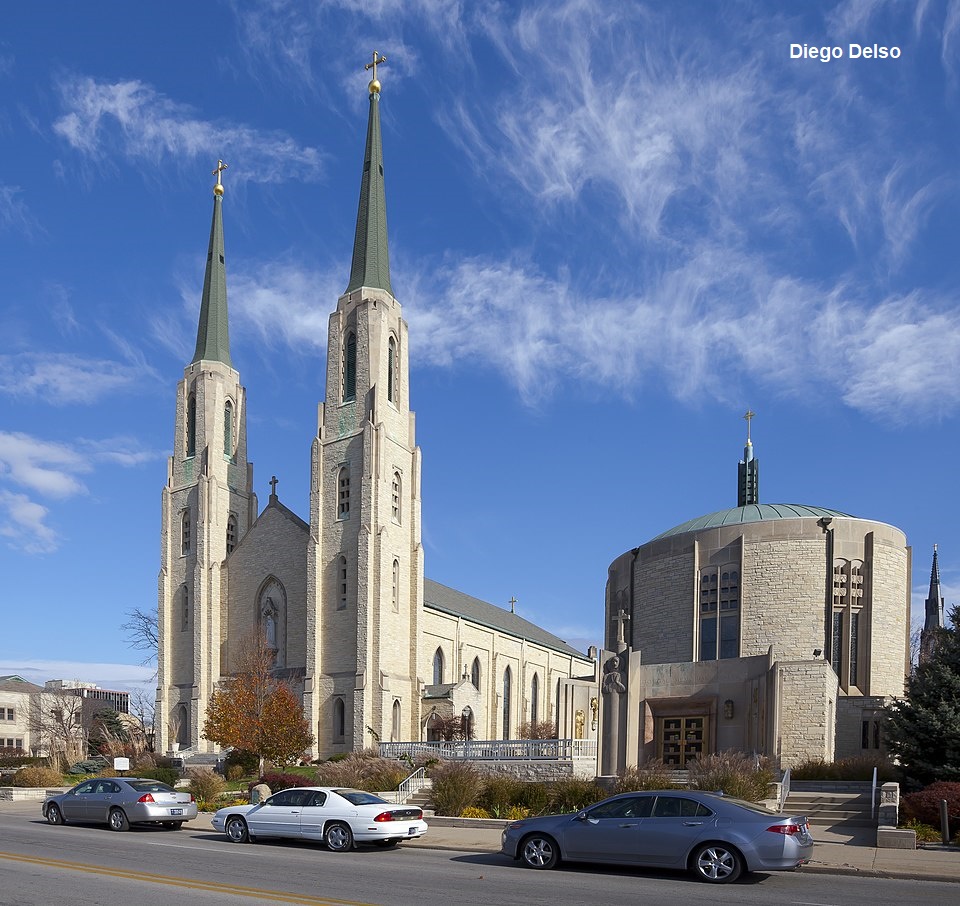
The Diocese of Fort Wayne–South Bend (Latin: Dioecesis Wayne Castrensis–South Bendensis) is a Latin Church ecclesiastical territory, or diocese, of the Catholic Church in north-central and northeastern Indiana, United States.
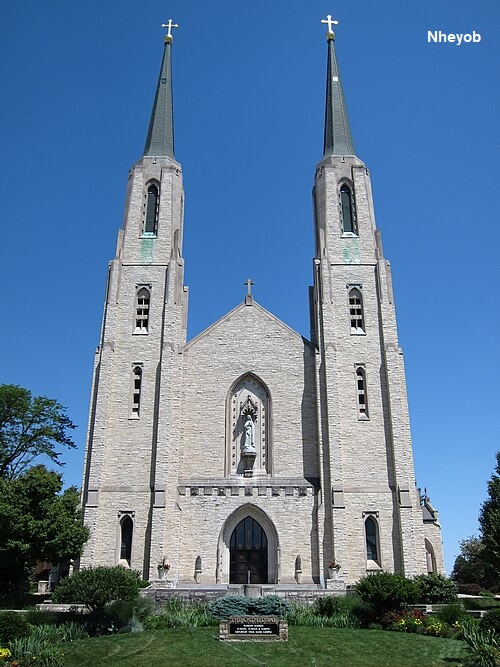
The Cathedral of the Immaculate Conception in Fort Wayne is the primary cathedral in the diocese, and Saint Matthew’s Cathedral in South Bend is the associate cathedral.
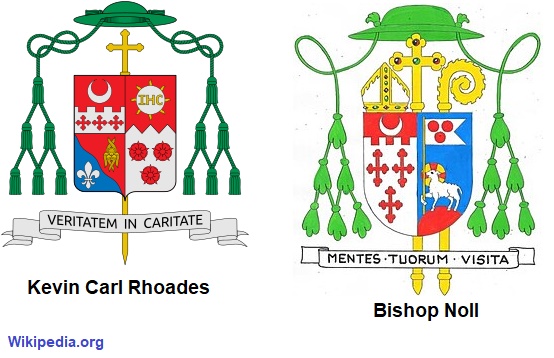
Bishop Kevin C. Rhoades was appointed bishop of Fort Wayne-South Bend by Pope Benedict XVI on November 14, 2009, and was installed on January 13, 2010.
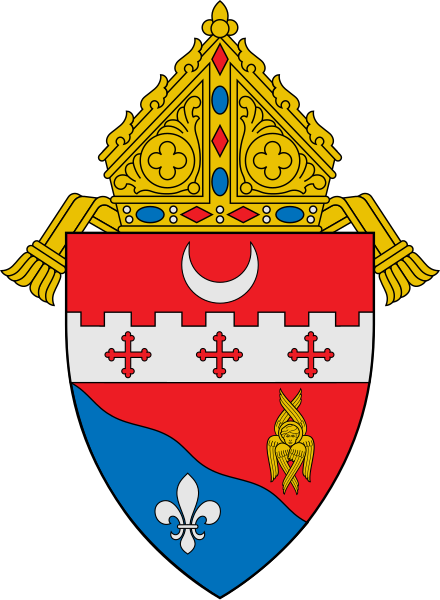
Notes:
The coat of arms was designed and adopted when the diocese was erected and adopted in 1960. Escutcheon: The arms of the diocese are composed of a crescent moon at the top with a fortified wall below it. The wall contains three Bottony crosses. Below the wall is a river bend flowing diagonally with a fleur-de-lis on it. A six-winged seraph stands between the river and the wall. Symbolism The crescent moon represents Mary, the mother of Jesus and patroness of the diocese. The three crosses represent the Holy Trinity. The fortified wall represents Fort Wayne. The angel identifies the patron of the cathedral in South Bend. The wavy line represents South Bend. The fleur-de-lis recalls the colonization of this region by French Catholics.
History
The Indiana area was part of the French colony of New France during the 17th and first half of the 18th centuries. French fur traders and missionaries under the Bishop of Quebec explored it. It became British territory after the French Indian War ended in 1763; however, the British government refused to allow American colonists to enter the region.
Several years after the American Revolution in 1789, Pope Pius VI erected the Diocese of Baltimore, covering the entire United States. John Francis served as vicar-general in the West from 1798 until he died in 1804. In 1808, Pope Pius VII erected the Diocese of Bardstown, with jurisdiction over the Indiana Territory and other areas in the Midwest. In 1832, Stephen Badin established a mission at South Bend in Indiana.
In 1679, French explorer René-Robert Cavelier, Sieur de La Salle, was the first European to cross into Indiana after reaching present-day South Bend at the St. Joseph River. He returned the following year to learn about the region. French-Canadian fur traders soon arrived, bringing blankets, jewelry, tools, whiskey and weapons to trade for skins with the Native Americans.
By 1702, Sieur Juchereau established the first trading post near Vincennes. In 1715, Sieur de Vincennes built Fort Miami at Kekionga, now Fort Wayne. In 1717, another Canadian, Picote de Beletre, built Fort Ouiatenon on the Wabash River to control Native American trade routes from Lake Erie to the Mississippi River.
In 1732, Sieur de Vincennes built a second fur trading post at Vincennes. French Canadian settlers, who had left the earlier post because of hostilities, returned in more significant numbers. British colonists arrived from the East in a few years and contended against the Canadians for control of the lucrative fur trade. As a result, fighting between the French and British colonists occurred throughout the 1750s.
The Native American tribes of Indiana sided with the French Canadians during the French and Indian War (also known as the Seven Years’ War). With the British victory in 1763, the French were forced to cede to the British crown all their lands in North America east of the Mississippi River and north and west of the colonies.
The tribes in Indiana did not give up: they captured Fort Ouiatenon and Fort Miami during Pontiac’s Rebellion. The British royal proclamation in 1763 designated the land west of the Appalachians for Native American use and excluded British colonists from the area, which the Crown called “Indian Territory.”
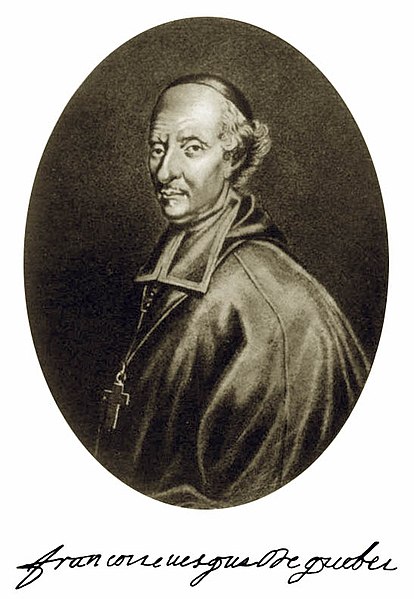
Francis-Xavier de Montmorency-Laval, commonly referred to as François de Laval (French pronunciation: [30 April 1623 – 6 May 1708), was a French Catholic prelate who served as Apostolic Vicar of New France from 1658 to 1674 and as Bishop of Quebec from its creation in 1674 until he retired due to poor health in 1688. He continued to work in New France until he died in 1708.
Among his accomplishments was founding the Séminaire de Québec in 1663. Laval was a member of the Montmorency family but renounced his rights as heir to pursue his ecclesiastical career.
Pope John Paul II beatified him on 22 June 1980, and Pope Francis declared him a saint on 3 April 2014
In 1674, fifteen years after he arrived in New France, Laval asked that the vicariate be promoted to a diocese. The Holy See established the Diocese of Quebec on 1 October 1674, naming Laval its first bishop.
He revisited the issue of alcohol sales to Indigenous peoples. In 1675, Laval, over the objections of Governor Louis de Buade de Frontenac, excommunicated all who sold alcohol to them. On 24 May 1679, Laval obtained a royal decree banning the trade.
In 1678, he obtained a royal edict stating that permanent curacies would be established in the colony. In 1681, he drew up the boundaries of parishes.
Among the earliest representatives of French culture in North America were Jesuit missionaries, who sought to bring the teachings of the Catholic Church to the Native Americans.
This week’s History Mystery is about a Jesuit missionary who arrived in New France (now Canada) in 1625. He spent most of the rest of his life among the Huron Indians, studying their language, culture, and religion and attempting to convert them to Christianity. He was killed in 1649 when a band of Iroquois attacked the Huron mission where he was staying.
Although the Jesuit missionary in question never appears to have set foot in what is now the Hoosier state, he does have an Indiana connection: A Jesuit Preparatory high school in Indianapolis that opened in 1962 carries his name. 1688, Allouez founded St. Joseph’s mission in the Potawatomi in northern Indiana.
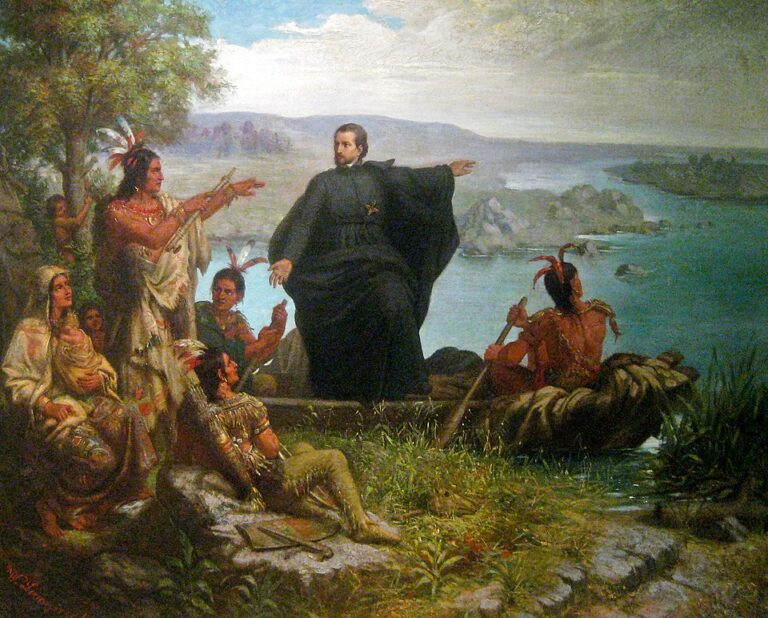
Jacques Marquette, S.J. [June 1, 1637 – May 18, 1675), sometimes known as Père Marquette or James Marquette, was a French Jesuit missionary who founded Michigan’s first European settlement, Sault Sainte Marie, and later founded Saint Ignace. In 1673, Marquette, with Louis Jolliet, an explorer born near Quebec City, was the first European to explore and map the northern portion of the Mississippi River Valley.
Most Jesuit missions to North America were in today’s Canada, but they explored and mapped much of the West. French missionaries Père Marquette and Louis Jolliet were the first Europeans to explore and chart the northern portion of the Mississippi River, as far as the Illinois River.
Peter De Smet was a Belgian Jesuit active in missionary work among the Plains Indians in the mid-19th century. His extensive missionary travels were said to total 180,000 miles. He was known as the “Friend of Sitting Bull” because he persuaded the Sioux War Chief to participate in negotiations with the United States government for the 1868 Treaty of Fort Laramie.
